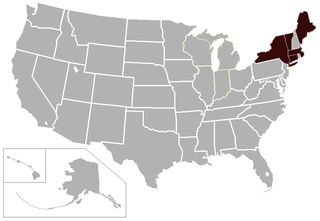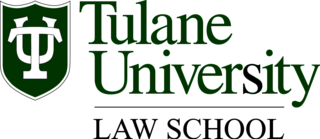Related Research Articles

Tulane University is a private research university in New Orleans, Louisiana. It was founded as a public medical college in 1834 and became a comprehensive university in 1847. The institution became private under the endowments of Paul Tulane and Josephine Louise Newcomb in 1884. Tulane is the 9th oldest private university in the Association of American Universities, which includes major research universities in the United States and Canada. The Tulane University Law School and Tulane University Medical School are, respectively, the 12th oldest law school and 15th oldest medical school in the United States. Tulane has been a member of the Association of American Universities since 1958 and is classified among "R1: Doctoral Universities – Very high research activity".

Wesleyan University is a private liberal arts university in Middletown, Connecticut. Founded in 1831 as a men's college under the auspices of the Methodist Episcopal Church and with the support of prominent residents of Middletown, the college was the first institution of higher education to be named after John Wesley, the founder of Methodism. It is now a secular institution.

The New England Small Collegiate Athletic Conference (NESCAC) is an American collegiate athletic conference comprising sports teams from eleven highly selective liberal arts institutions of higher education in the Northeastern United States. The eleven institutions are Amherst College, Bates College, Bowdoin College, Colby College, Connecticut College, Hamilton College, Middlebury College, Tufts University, Trinity College, Wesleyan University, and Williams College.

Illinois Wesleyan University is a private liberal arts college in Bloomington, Illinois. Founded in 1850, the central portion of the present campus was acquired in 1854 with the first building erected in 1856.

Ohio Wesleyan University (OWU) is a private liberal arts university in Delaware, Ohio. It was founded in 1842 by Methodist leaders and Central Ohio residents as a nonsectarian institution, and is a member of the Ohio Five – a consortium of Ohio liberal arts colleges. Ohio Wesleyan has always admitted students irrespective of religion or race and maintained that the university "is forever to be conducted on the most liberal principles."

Virginia Wesleyan University (VWU) is a private university in Virginia Beach, Virginia. The university is nonsectarian but historically affiliated with The United Methodist Church. It enrolls 1,607 students annually in undergraduate and graduate programs, 355 students at LUJ/VWU Global (Japan), and 1,403 in VWU Online. Virginia Wesleyan transitioned from a college to a university in 2017.
Excelsia College, formerly Wesley Institute, is a tertiary education provider in Sydney, Australia, offering undergraduate and postgraduate degrees in counselling, performing arts, teacher education and business.

Indiana Wesleyan University (IWU) is a private evangelical Christian university headquartered in Marion, Indiana affiliated with the Wesleyan Church. It is the largest private university in Indiana.

PCU is a 1994 American comedy film written by Adam Leff and Zak Penn and directed by Hart Bochner about college life at the fictional Port Chester University, and represents "an exaggerated view of contemporary college life". The film is based on the experiences of Leff and Penn at Eclectic Society at Wesleyan University in Middletown, Connecticut.

H. Sophie Newcomb Memorial College, or Newcomb College, was the coordinate women's college of Tulane University located in New Orleans, in the U.S. state of Louisiana. It was founded by Josephine Louise Newcomb in 1886 in memory of her daughter.

Tennessee Wesleyan University (TWU) is a private Methodist university in Athens, Tennessee. It was founded in 1857 and is affiliated with the Holston Conference of the United Methodist Church. It maintains a branch campus in Knoxville, where it offers evening programs in business administration. It also conducts its nursing classes in Knoxville.

Salem State University is a public university in Salem, Massachusetts. Established in 1854, it is the oldest and largest institute of higher education on the North Shore and is part of the state university system in Massachusetts.

North Carolina Wesleyan College (NCWC) is a private Methodist college in Rocky Mount, North Carolina. Founded in 1956, the school offers a number of degree programs in the arts and sciences and selected professional disciplines. North Carolina Wesleyan also offers evening courses at its main Rocky Mount campus, as well as satellite locations in Morrisville, Goldsboro, Greenville, Whiteville, Washington, and Wilmington, North Carolina.

Chabad on Campus International is a division of Merkos L'Inyonei Chinuch, the educational arm of the Chabad Lubavitch movement. It is one of the largest Jewish organizations serving college campuses, with over 185 permanent branches on North American campuses, and an additional 250 globally.

Southern Wesleyan University is a private Christian university in Central, South Carolina. It was founded in 1906 by what is now the Wesleyan Church. The institution is accredited by the Southern Association of Colleges and Schools Commission on Colleges to award associate, bachelor's, master's, and doctoral degrees.

Tulane University Law School is the law school of Tulane University. It is located on Tulane's Uptown campus in New Orleans, Louisiana. Established in 1847, it is the 12th oldest law school in the United States.
JuicyCampus.com was a website focusing on gossip, rumors, and rants related to colleges and universities in the United States. As of February 5, 2009, it is out of business.

As a result of Hurricane Katrina and its effects on New Orleans, Tulane University was closed for the second time in its history—the first being during the American Civil War. The university closed for four months during Katrina, as compared to four years during the Civil War.

The Renren Network, formerly known as the Xiaonei Network, is a Chinese social networking service similar to Facebook. It was popular among college students. Renren Inc. has its headquarters in Chaoyang District, Beijing, with additional offices in Shanghai and Guangzhou. Renren had an $740m initial public offering (IPO) on the New York Stock Exchange in April 2011.

DateMySchool is an online dating platform targeted toward university students and alumni. It requires a university email address, and claims that it permits only verified students and alumni to join. It allows users to filter by schools, departments, individuals and other groups from accessing their profiles - subject to the same security policy based on university email addresses. The site does not index profiles on Google.
References
- ↑ Frank, P. http://collegeacb.blogspot.com/.
- ↑ Frank, P. http://collegeacb.blogspot.com/.
- ↑ "Archived copy". Archived from the original on 2010-10-27. Retrieved 2010-05-15.
{{cite web}}: CS1 maint: archived copy as title (link) - ↑ Baltimore Sun, http://gadidechter.com/?p=77
- ↑ Frank, P. http://collegeacb.blogspot.com/.
- ↑ "The Gossip Master Of College Acb". Time . Retrieved April 5, 2010.
- ↑ Sichel, Jared (2010). "Banning College ACB", Tulane Hullabaloo .
- ↑ Frank, P. http://collegeacb.blogspot.com/.
- ↑ Koch, Elizabeth (2009). "Is College ACB getting too juicy?", Truman State University Index .
- ↑ Emery, Regina. (2010). "SGA discusses bringing back UTM Student Court", The Pacer .